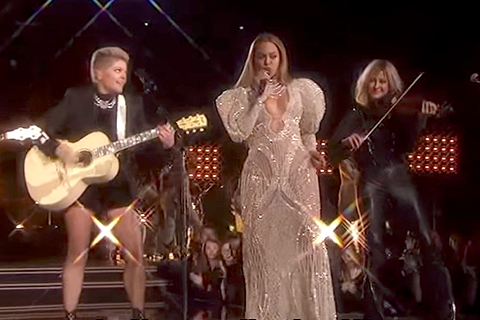Why the Beyoncé CMA Performance With The Dixie Chicks Was A Feminist Triumph
thinx archive
·5 min read

by Kelsey Duchesne | 11/03/2016
On November 2nd, Beyoncé and the Dixie Chicks took the Country Music Award stage to perform Daddy Lessons, a track on Beyoncé's latest album Lemonade. A week before the election, with the phrase “Grab Your Pussy” riddled across the internet and beyond, their collaboration felt especially poignant-- 4 women who had been disrespected and verbally assaulted by men and woman who claimed their ugliness was for the good of pure, good ‘ol country music. Cue eyeroll. Cue screaming in a supply closet by yourself. Cue the self combustion.
The CMA stage is not one that has ever been linked to one of the world's biggest pop stars, Beyoncé, and the Dixie Chicks exited long ago, angry and spent. As lead singer Natalie Maines confirmed on Twitter that the Dixie Chicks never planned to perform on the CMA stage again (like, ever), but Beyoncé, a country outsider, invited them back in. They accepted. The performance was the best and most talked about of the evening.
The Dixie Chicks were shut out of country music in 2003, shortly after their comments about then-President George W. Bush and their disappointment in the Iraq War. Almost immediately after the show in London, the story exploded, and their fans were *literally* burning their CD’s in yards. That actually happened. Their tour sales dropped, and they were shunned from their industry. The fall and redemption of the Dixie Chicks was chronicled in their documentary Shut Up And Sing. Their first album after the controversy, Taking The Long Way, retold the aggression they received from the country community, especially in their first hit I’m Not Ready To Make Nice. “It's a sad, sad story/ When a mother will teach her daughter/ That she ought to hate a perfect stranger,” Natalie crooned, describing their fans backlash. “And how in the world/ Can the words that I said/ Send somebody so over the edge/ That they'd write me a letter/ Saying that I better/ Shut up and sing/ Or my life will be over?”
The album was nominated for 5 Grammy Awards in 2007, and won Best Country Album and Album of the Year. The Dixie Chicks were nominated for 1 CMA awards for that album, and only 2 nominations in total since their comments about George Bush. Previously, they had been CMA wonderkins, winning 10 awards in just 4 years. The Dixie Chicks were publically shunned and scorned for their political beliefs, while country stars like Blake Shelton can write homophobic tweets and still maintain his title as country star and heartthrob (seems fair? jkjkjk).
Given all that we know, we believe that Beyoncé was thinking about this history (she’s always one step ahead), and it’s one of the main reasons she invited them. If Beyoncé was going to take over a new stage, she knew who to extend the invitation to- fellow female powerhouses who are considered outsiders.
I know what you’re thinking-- How could Queen Bey, a woman that has to perform in front of stadium-length screens so her thousands of audience members be seen as an outsider? Despite Beyoncé's reign over the music industry, she’s not from Nashville, she doesn’t sing exclusively country, and she’s not white.
Despite Beyoncé being a southern woman from Houston and Daddy's Lessons being a superb country song, some CMA fans were upset about her performance, threatening to boycott the show (which is like “lol” but they seemed to think this was a major threat). Racist rhetoric like this. Ignorant declarations like this. We won’t go on, or we will end up like this.
The attack on Beyoncé particularly stung because of the amount of country talent that has been produced by men and women of color, yet are not acknowledged or seen by the CMAs. Charley Pride is the only black artist to win the CMA Entertainment of the Year award in 1971-- 45 years ago. Despite black men and women making significant contributions to the country music community, that have never had a large presence in the CMA’s. ”Tough girl is what I had to be,” the four Texans crooned to the audience, stage and screen, that hadn’t welcomed them. The naysayers didn’t matter, of course, because they had made the stage their own.
It was theirs.
Image: Country Music Association/ABC
by Kelsey Duchesne


